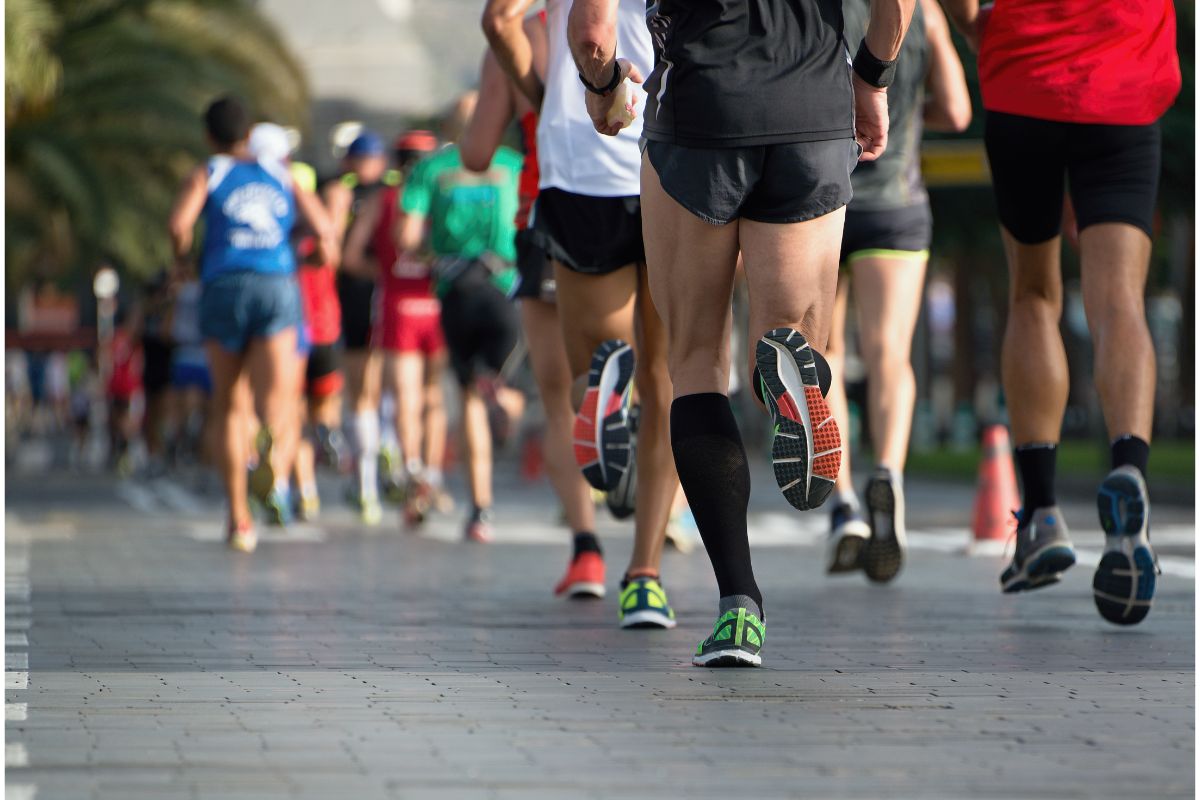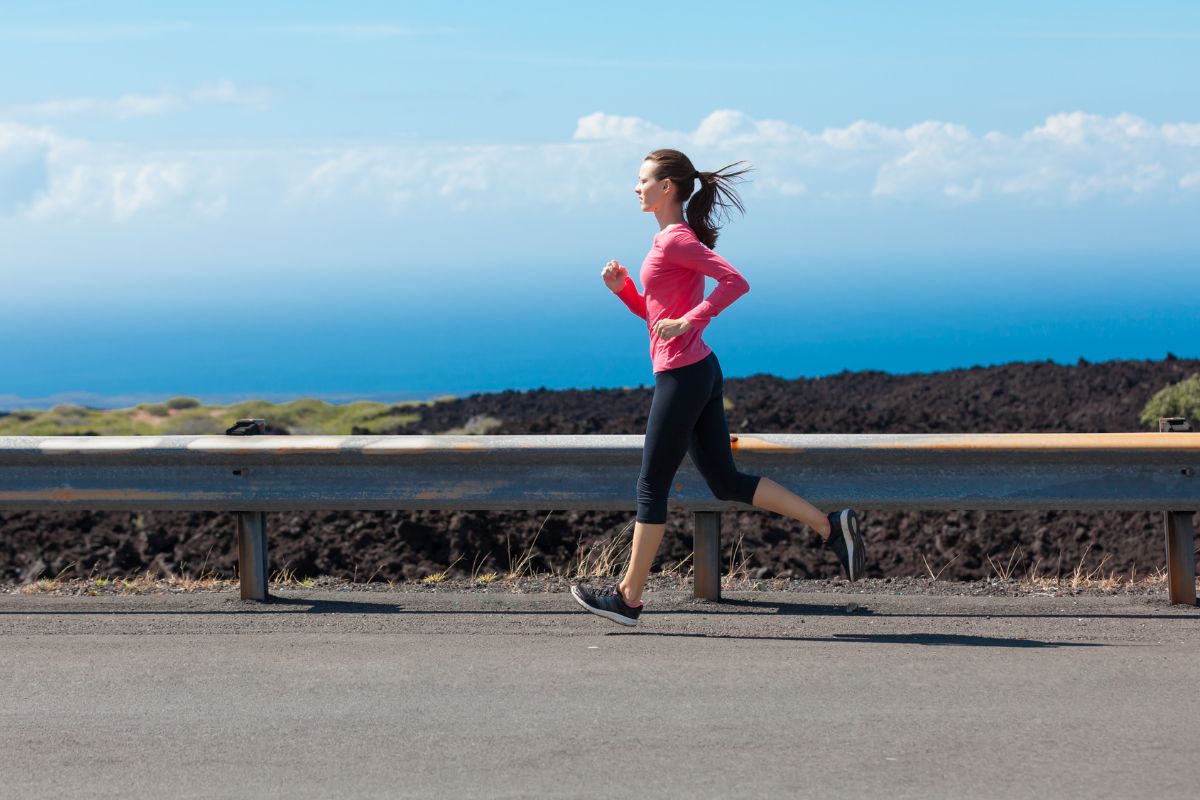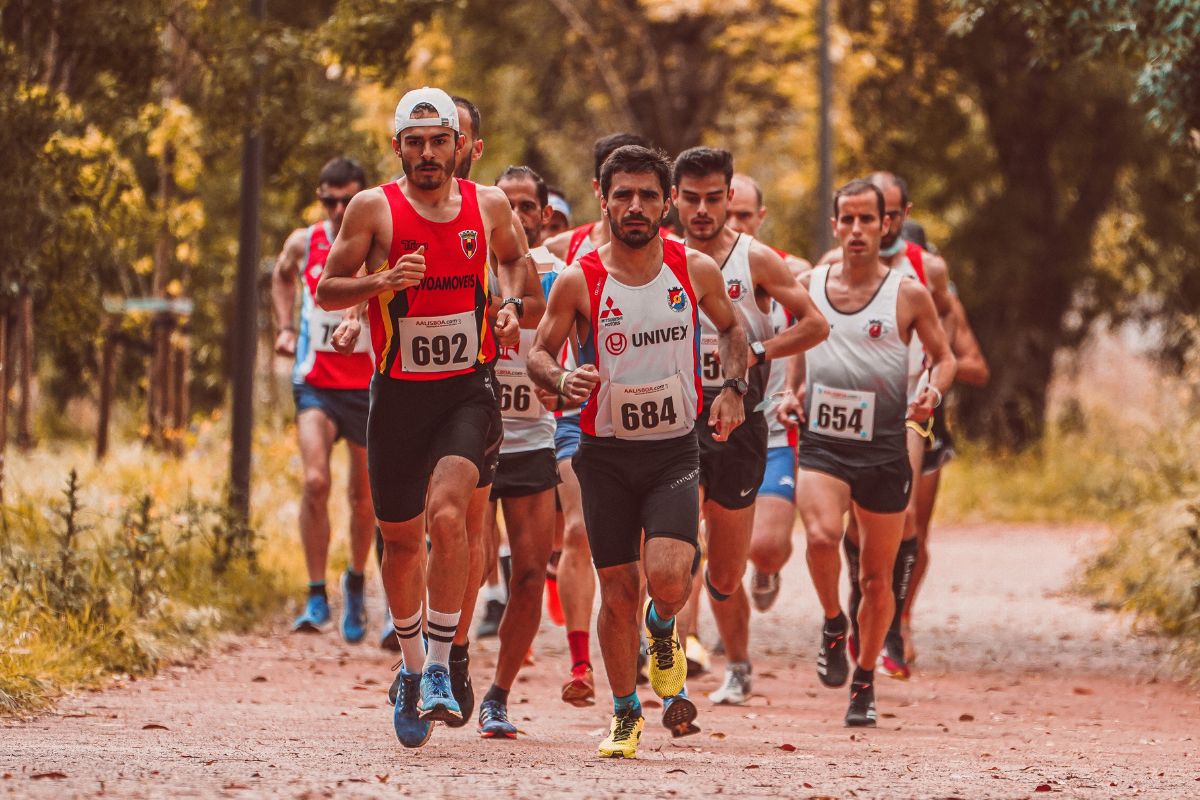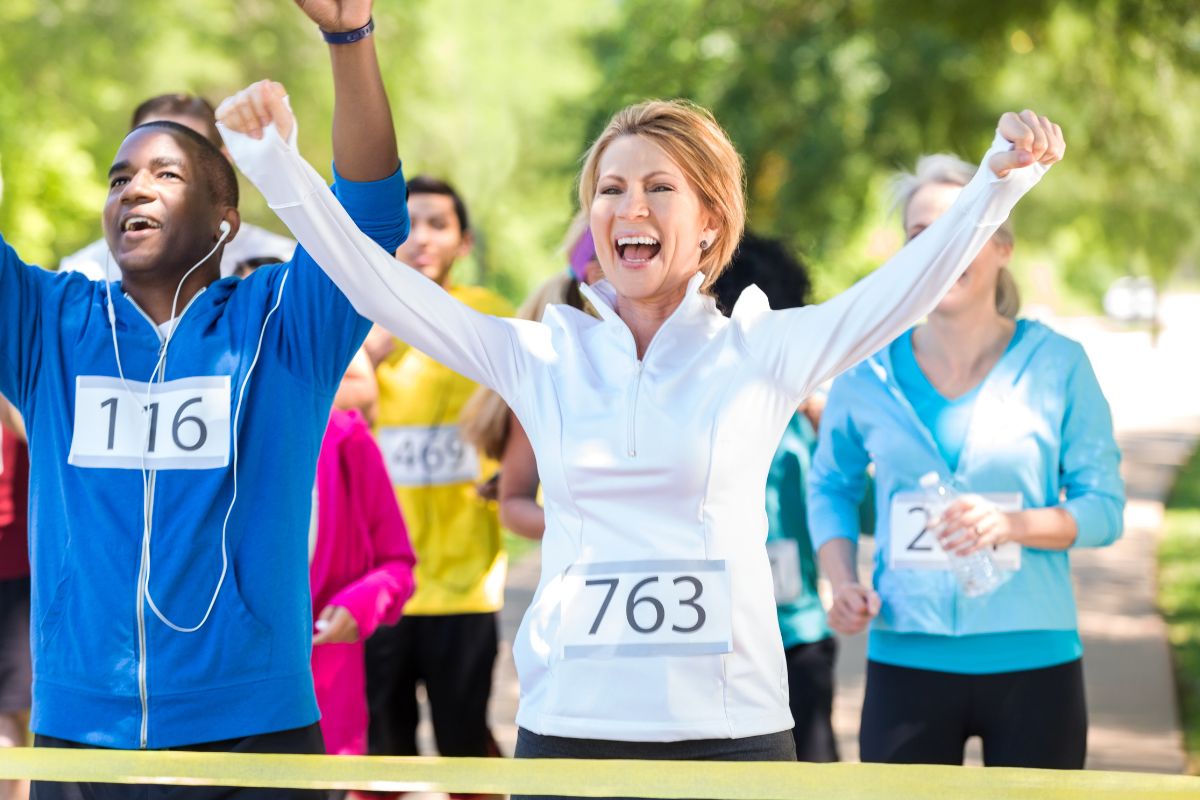Running is a great exercise! It’s a fantastic way to spend some time outdoors, and is great for the body and mind.

However, some people don’t find it as easy as others! Many people feel like their legs are heavy and useless when they’re running.
It can feel like a real struggle to get them to do what you want them to do! What causes heavy legs in runners?
Do You Get Heavy Legs When Running?
While running can be a lot of fun to do, and can be a great way of helping you to get in better shape and maintain your cardiovascular health, it’s not always as easy for everybody as we’d like!
WHile ideally running should make us feel light and nimble the more we do it, it’s not like that for everybody.
Many people find that they feel like their runs aren’t as enjoyable as they could be because they feel like they’re dragging lead weights around on their legs.
It can feel as if your leg muscles are working against you, in fact! Try as you might, they simply won’t work as you want them to.
Well, the good news is that you’re not alone in this!
Lots of runners go through this phase of feeling like their legs just aren’t doing the job.
And, in most cases, the feeling of having heavy legs is something that’s fixable by simply making a few small changes!
So, let’s have a look at some of the reasons why you might have heavy legs while running.
We’ll also discuss some things that you can do to help prevent heavy legs!
Reasons For Heavy Legs
There are actually a few reasons why you might feel as if your legs are working against you when you’re running.
It might be easy to give yourself grief about it, but the simple fact is that heavy legs happen to a lot of runners!
This is especially true for people who are newer to running, or who are pushing themselves a little (or a lot!) further in their running than they would normally.
Don’t worry, as there are a few things that you can do to help prevent heavy legs from happening.
First, however, let’s take a look at some common causes of heavy legs in runners!
Lack Of Rest Time
One of the most important things for runners is to make sure that you’re getting enough rest time between runs – and, in fact, between any time you exercise your legs.
This means, for one thing, that you need to ensure that you take regular breaks when you’re running.
If you don’t, and you push past the limits of your leg muscles, then it’s hardly going to be a surprise that you’re going to find running harder and harder.
This also means that you need to make sure to take time off from running and exercising at all! The simple fact is that you need rest days. They’re an absolutely essential part of training your body.
The recovery process after any physical activity takes time, and if you don’t give your body time to recover then again, you can’t be surprised when it underperforms! So, make sure to take your rest days seriously, as they’re absolutely vital.
Improper Form
While it might be easy to think that running is the most natural thing to do in the world, it’s actually more complex than a lot of people might think.
One of the things that all good runners know is how important correct running form is in order to be able to keep running efficiently and without long-term pain.
If you don’t have great running form, then you’ll be expending more energy than you need to in order to do the same amount of work.
You’ll also likely be putting your muscles and joints under more strain than they need to be.
As such, always try to maintain the best running form, as it’s key to keeping your legs in great shape!
Incorrect Diet
Food is so important for everybody! And, the more physical activity you do, the more food you’ll need to consume in order to keep your body going.
Running takes energy, and the way we get energy is through food! If you’re not eating at your best, then your muscles are going to really feel that lack of fuel.
Even if you’re running to lose weight, you can’t simply skip meals and expect to have good performance.
Making sure that you’re keeping to a healthy eating routine, with good healthy foods and the right amount of protein and carbohydrates, is key to getting good running performance.
This doesn’t mean you need to spend money on expensive shakes and supplements – learning to cook good food is far more important to your development!
Bad Sleep Habits
Just as we need days off and a good diet to keep our body in the best condition, we also need to make sure that we’re sleeping well.
It might not seem obvious, but sleep is another important part of our body’s recovery process.
This is true whether it’s for physical or mental activity! We absolutely need to sleep well in order for our body and brain to be working at their best.
If you’re not sleeping well, and aren’t getting enough sleep, then your body won’t be able to recover from any activity as well as it should.
Not just that, but you’ll also notice that your physical and mental performance is hampered due to lack of sleep.
You’re Not Hydrated Enough

You remember, of course, that food is important for running, as mentioned earlier.
ANother aspect that many runners still overlook is hydration. If you’re not drinking enough water, then you’re not doing your body the good it needs!
Making sure that you’re drinking enough water is essential for anybody, and it becomes even more important when running as your body will need more water to keep going.
This isn’t something that you need to overcomplicate. It really is as simple as drinking some water when you feel thirsty.
So, don’t worry about timing your hydration, or anything that can lead you to overthink things. Trust your body. If you’re thirsty, it’s time for a drink.
Strength Training
Strength training is another thing that many runners overlook. As you’re using your leg muscles so much when you’re running, however, strength training is something that every runner needs to consider!
If you’re not doing enough strength training outside of running, then it’s very likely that your legs won’t be able to perform as well as they could.
However, don’t make the mistake of overcorrecting, and doing too much strength training without recovery time.
Getting stronger is of course a great thing to do, but you need to make sure that your body has time to deal with the workout you’ve just put it through!
So, even though you need to do strength training, make sure that you’re not overtraining – and that you’re taking time off to rest.
Wrong Footwear
Having the right footwear is something that shouldn’t be forgotten about by runners.
Although you can of course technically run in any footwear you like, there are some types of footwear that are better suited for runners!
If you’re not getting the support and cushioning that you need from your shoes, you’ll be likely to notice muscle fatigue sooner.
You’re also running the risk of causing yourself pain and injury! So, if you’re going to be running, use appropriate footwear.
Make sure that you’re using sensible running shoes, and also make sure that you’ve got the right size for your feet.
Health Issues
With all of that in mind, it’s also possible that there could be some underlying health issues which can also make running more difficult for some people, and can contribute to the feeling of heavy legs.
It’s a good idea to make sure that you’re not going to cause yourself harm when you’re running, so if you’re worried that you might have a health problem that is interfering with your ability to run, then it’s worth getting it checked out by a doctor.
How You Can Help Prevent Heavy Legs

Now that we’ve had a look at some of the most common causes of heavy legs for runners, let’s have a look at some things that you can do to help prevent them!
Of course, remember that if you have a health condition that interferes with your ability to run, then the absolute most important thing you can do is to discuss it with a doctor.
Having said that, there are of course a few other things that can help out many runners who may be feeling the effects of heavy legs.
Get Some Rest!
We’ve mentioned this a few times before, but it really does bear repeating.
Making sure that you’re getting the right amount of rest is absolutely essential to getting the best out of your body.
It’s a really important thing to do for any runner, as you simply won’t be able to run as well as you should if you’re not well rested.
So, make sure that you’re taking the idea of rest days seriously, or you’re hampering your training needlessly.
Eat And Drink Better
Your diet is so important when it comes to your body. So, if you’re not getting enough food of the right types, then you’re going to underperform!
You’ll be far more likely to have difficulties such as heavy legs when you’re running.
With that in mind, make sure you’re eating enough to cover the extra energy you’re expending, as well as enough to let your muscles develop.
Keep drinking enough water too! Make sure to have a drink handy whenever you’re running, and drink anytime you feel like you need to.
Sleep Better
Getting enough sleep is essential for absolutely everything we do! We simply can’t perform as well if we’re tired, and a lack of sleep eventually piles on and catches up to all of us.
So, if you’re not sleeping as well as you need to, it’s likely to manifest itself in the form of heavy legs when you’re out running!
Just as it’s important to take time off from running, it’s important to make sure you’re taking time off from being awake too!
Warm Up & Cool Down
You can’t just jump up from a sitting position and start sprinting without it causing you some issues – your body simply doesn’t work like that!
Your muscles need to be warmed up before exercise in order to work well and help you to do what you need to efficiently and with reduced risk of injury.
Likewise, take time to cool down after you’ve finished running. Doing these things is essential to keeping your muscles in their best condition!
Check Your Shoes
Finally, have a look at your running shoes and see if there’s any problems there! If they’re uncomfortable to wear, for instance, then this can affect far more than just your feet.
If they’re poorly fitting – too tight or too loose – then you’ll find yourself adjusting your running style to compensate, which can cause issues.
Getting a good fitting and comfortable pair of running shoes is really important!
Conclusion
There are of course many reasons why you might feel as if your legs are heavy and cumbersome when you’re running.
Luckily, there are a few things that most people can easily do to help them out with their running.
Of course, if you’re worried that you might have a health problem that’s affecting your running, then the most important thing to do is to get medical advice from a doctor.
Hopefully, this guide has helped you to learn what you needed to know about heavy legs while running!
- Can Dogs Run Faster Than Humans? (Running With Your Furry Friend) - October 4, 2022
- 10 Doggie Fun Runs You Will Love [Ultimate Guide] - October 4, 2022
- What Are Division Results In Running? - October 4, 2022








